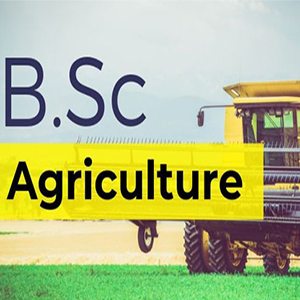B.Sc Agriculture Course Details, Fee and Eligibility
 B.Sc. in Agriculture is mostly pursued by students that have interest over the development of the agricultural sector of the country, by bringing new feasible agricultural methods and discovering other essential materials for sustainable agricultural practices. It is a four year professional undergraduate degree course which is taught in Indian universities to students coming from science background.
B.Sc. in Agriculture is mostly pursued by students that have interest over the development of the agricultural sector of the country, by bringing new feasible agricultural methods and discovering other essential materials for sustainable agricultural practices. It is a four year professional undergraduate degree course which is taught in Indian universities to students coming from science background.
The fundamental of studying B.Sc. Agriculture is scoring at least 50 percent marks in the 10+2 standard as most of the colleges and universities demand the same.
Based on the results of entrance examinations like KEAM, EAMCET and others, students are allowed to study this course at state and centrally recognized universities. At present, there are 42 State Agricultural Universities (SAUs), one Central Agricultural University (CAU), 5 Deemed Universities (DUs), and 4 general Central Universities where this course is imparted. The colleges and universities offer admission in undergraduate level across 11 disciplines, where students are granted enrolment. Though the course is not so popular among the students, there are heavy demands of skilled professionals in this domain.
Course Curriculum
The curriculum of agricultural science generally involves the study of modern scientific equipment and methods used in agricultural sciences, land surveying, soil science, water resource management, animal and poultry management, basics of biotechnology, where the subjects that are studied are agronomy, plant biochemistry, water management engineering, study of pests and crops, and many other.
The aim of this course is to make students aware of the modern artifacts and techniques used in agriculture and it brings out the best from the students for developing more prosperous for improvement of production.
The disciplines which cover this broad course are:
1. Agriculture (agronomy)
2. Veterinary Science
3. Forestry
4. Fisheries
5. Horticulture
6. Home Science
7. Soil Science
8. Plant Genetics
9. Entomology
10. Plant Pathology
11. Agriculture Extension
12. Agricultural Meteorology
13. Agriculture Economics
Eligibility Criteria
The students interested in studying this course need to match the eligibility criteria, i.e. having physics and chemistry as main subjects of study and with that, they should study either mathematics or biology.
Course Fee
On average, the course fee for studying B.Sc. agriculture is between INR 10,000 and 50,000 per annum, which may vary for different private and public sector colleges.
Admission Process
The admission process varies from colleges to colleges, which students should find at the respective college websites. Colleges either allow direct admission or conduct written examinations. But mostly, admission is done through entrance examinations like PJTSAU, ICAR AIEEA, CUEE, UPCATET, VIT Vellore, KEE, SAAT, BCET, KCET, BCKV, KAU, JCECE, JECRC, etc.
Agriculture Career Prospects
Graduates will find jobs in the public as well as private sectors in this field, but they need to possess excellent theoretical knowledge about agricultural science. Since agricultural science is a growing field of study in India in this 21st century, there are high demands for professionals and it is increasing every year. Central or state governments are accepting graduates happily in projects. There are private research organizations, commercial farming, extension services and lots in this field, which are ready to pay good amount to graduates.
Graduates can work in different positions with salary bands as follows:
1. Agriculture Officer - INR 20,000 – INR 35,000
2. Assistant Plantation Manager - INR 30,000 – INR 40,000
3. Agricultural Research Scientist - INR 10,000 – INR 40,000
4. Agriculture Development Officer - INR 20,000 – INR 35,000
5. Agricultural Technician - INR 20,000 – INR 30,000
6. Marketing Executive - INR 15,000 – INR 30,000
7. Rice Breeder - INR 40,000 – INR 60,000
8. Seed Technologist - INR 15,000 – INR 25,000
Depending on the work profile or industry, the students should select the right job by keeping the future growth in mind.

